If you’re heavy into tracking your nutrition to get the most out of your time in the gym, you may have tried or wondered about creatine. Creatine is a naturally occurring amino acid that plays a role in energy production. While we ingest some in the foods we eat, the best creatine supplements can also up your daily intake to potentially replenishing energy stores more quickly. (1)
Decades of research on creatine indicates that it may increase your strength and power output, help build muscle mass, and recover more quickly after workouts. However, just like with any supplement, there’s a chance you’ll experience some side effects. Many lingering (and anecdotal) concerns have been refuted through studies, but creatine is considered safe to consume. (2) However, it’s still possible that creatine side effects could crop up in certain individuals. Let’s dive into the science of creatine, how it can boost your training, and what you need to know about its potential side effects.
Editor’s Note: The content on BarBend is meant to be informative in nature, but it should not be taken as medical advice. When starting a new training regimen and/or diet, it is always a good idea to consult with a trusted medical professional. We are not a medical resource. The opinions and articles on this site are not intended for use as diagnosis, prevention, and/or treatment of health problems. They are not substitutes for consulting a qualified medical professional.
Key Takeaways
- Creatine is considered generally safe and many of its side effects have been debunked by research. (3)
- Creatine is not an anabolic steroid.
- The potential negative side effects of creatine are gastrointestinal distress, short-term water retention, dehydration, muscle cramping, and potential interactions with the kidneys.
- There are not enough studies to validate the long-term effects of creatine.
What Is Creatine?
“Creatine is a naturally occurring non-protein amino acid compound primarily found in meat and fish,” says our expert reviewer and registered dietitian Courtney Pelitera. “Creatine’s primary role in the body is to aid in the resynthesis of ATP (from phosphocreatine) to provide energy during muscular contraction.” (5)
Simply put, creatine creates the energy needed for muscle contraction, leading to faster and stronger movements. (1)(4) Phosphagens are key to keeping energy available in your body to optimize athletic and sports performance during activities like sprinting or weightlifting. Your body naturally has phosphagens, but ingesting creatine can increase your phosphocreatine concentration. (1)
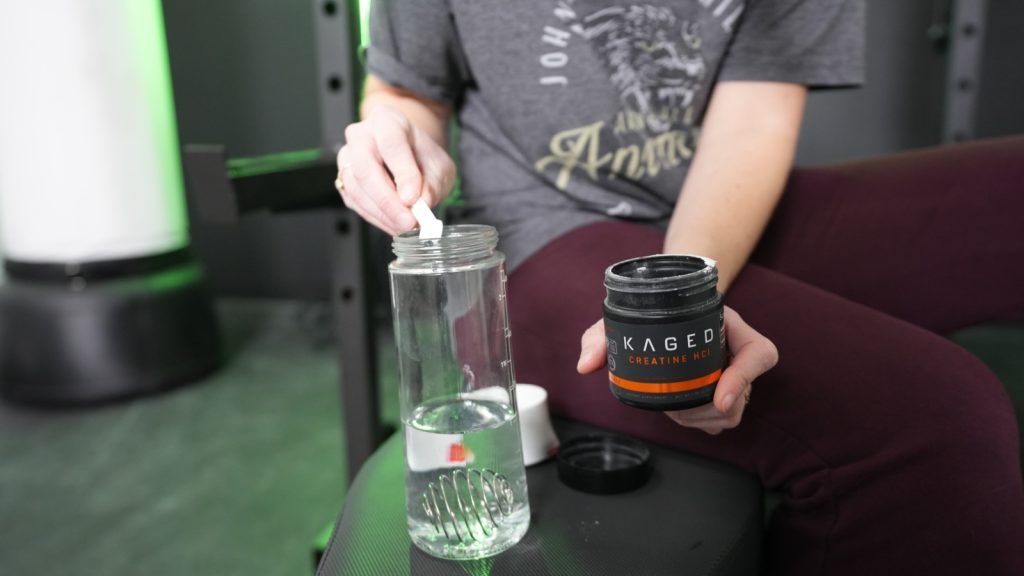
With more phosphagens in your system, your muscle cells can produce more ATP — adenosine triphosphate. ATP is needed for cellular energy and is expended during muscle contractions in short-duration, high-intensity exercises. With more stored phosphagens from creatine supplementation, ATP can replenish more quickly. (5)
Sources of Creatine
You can increase your creatine by eating certain foods or taking a creatine supplement. While there are many types of creatine supplements on the market, creatine monohydrate has been the most studied for its benefits to strength training. (6) “Creatine is…found naturally in animal proteins such as meat and fish,” says Courtney Pelitera, our expert reviewer and a registered dietitian. “Foods such as beef, pork, herring, tuna, and salmon are great examples of naturally occurring creatine.”
If you follow a vegetarian diet or don’t consume animal products, Pelitera adds that supplements may be a good option. “Vegetarians could especially benefit from creatine supplementation, as the vegetarian diet does not contain many natural sources,” she says. (4)
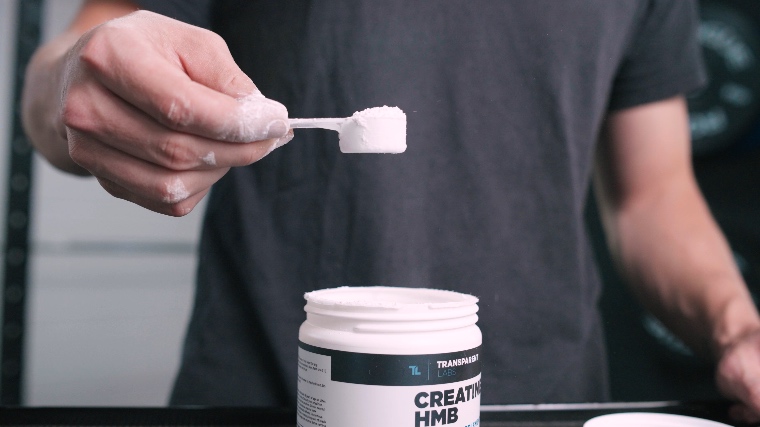
Since it can be difficult to get much creatine through any of these food sources, supplementation may be a more efficient way to boost your strength gains. That said, if you want to avoid all potential creatine monohydrate side effects, foods with creatine don’t run the same risks as supplements.
Here are eight forms of creatine supplements and foods with the highest amounts of creatine or creatine precursors to choose from.
- Creatine Monohydrate Supplements
- Creatine HCI Supplements
- Creatine HMB Supplements
- Creatine Kre-Alkalyn
- Steak, Ground Beef, Poultry
- Herring, Cod, Tuna, Salmon
- Parmesan Cheese
- Pumpkin Seeds, White Beans, Walnuts
What are the Negative Side Effects of Creatine?
The robust body of research on creatine has helped refute many common misconceptions and myths about its potential side effects. “Taking creatine as a supplement has very little known side effects,” says our expert reviewer and registered dietitian Courtney Pelitera.
“While the most well-documented potential side effects include gastrointestinal upset, muscle cramps, and an increase in overall body weight (due to increased fluid in the muscle cells), most of these are not heavily reported in clinical trials,” she adds. (3)(7) Let’s get up to date on the latest information regarding general concerns with regular creatine supplementation, including dehydration and kidney interactions.
Gastrointestinal Distress
Although there has been disagreement about many of the potential side effects of creatine, no one can dispute that it may cause gastrointestinal (GI) distress. Substances affect each individual differently, and if you already have a sensitive stomach, you may be at risk.
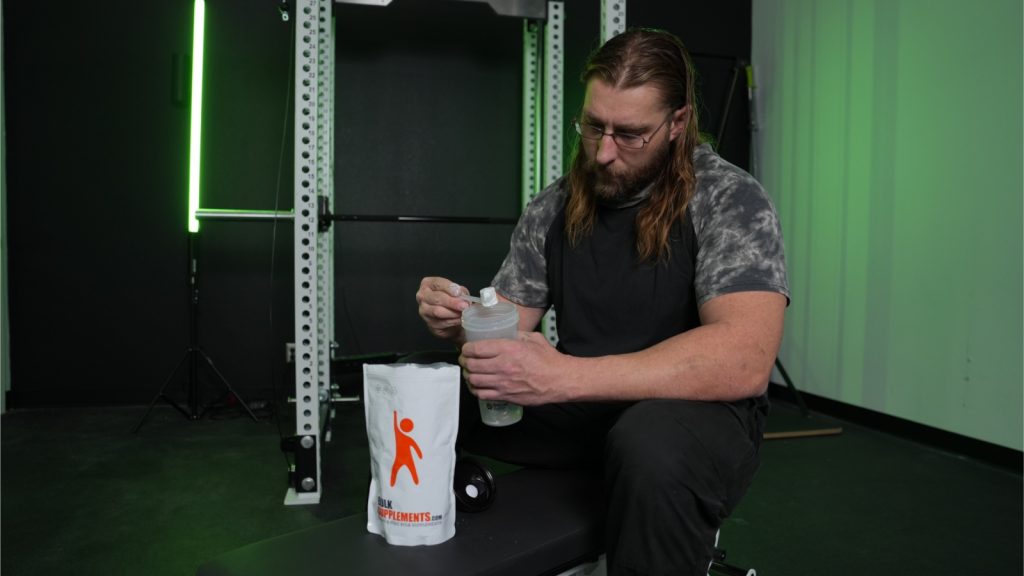
The main symptoms that users report are diarrhea, belching, and stomach discomfort. This study on the unpleasant GI effects of creatine notes that high doses — exceeding the recommended daily 3 to 5 grams — could make the symptoms worse. Taking more than 10 grams of creatine per day may increase the odds of gastrointestinal side effects. (7)
Water Retention
A long-held concern about creatine has been its supposed potential to induce body weight gain by increasing water retention. In an article reviewing the scientific evidence of these claims, this was found to be incorrect. (3) Creatine has likewise not been found to increase body fat across many ages and genders. (3)
While creatine may lead to short-term water retention in the early stages of ingestion, it has not been shown to increase total water weight in the long term. (3) This may be a result of creatine leading to increased intracellular volume in the first few days as your body adjusts. If you regularly take creatine and are wary about how much water to drink in a day, short-term water retention may be a possible side effect to consider. (6)
Dehydration and Cramping
Another lingering misconception of regular creatine intake is the potential for dehydration or cramping during exercise. To investigate these claims, one meta-analysis assessed research addressing the effect of creatine supplementation on exercise heat tolerance and hydration status. The authors investigated 10 peer-reviewed studies related to creatine’s effect on thermoregulation, dehydration, hyperthermia, heat tolerance, exertional heat illnesses.
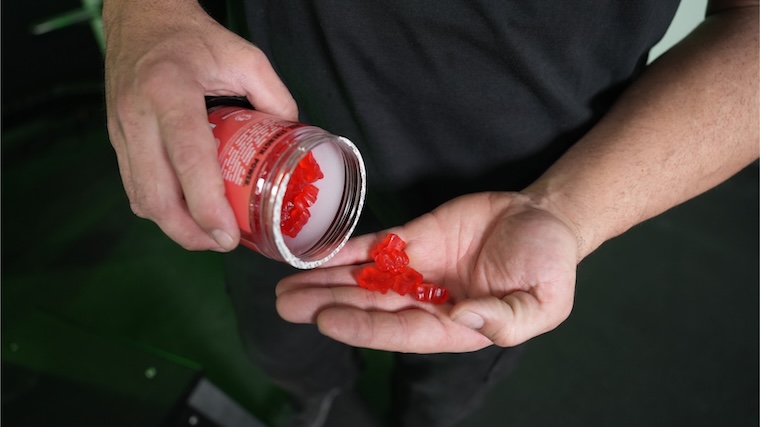
After analyzing the results of these studies, the researchers concluded, “No evidence supports the concept that creatine supplementation either hinders the body’s ability to dissipate heat or negatively affects the athlete’s body fluid balance. Controlled experimental trials of athletes exercising in the heat resulted in no adverse effects from creatine supplementation at recommended dosages.” (8)
Despite these results, some athletes swear that they may feel dehydrated or experience cramping after using creatine. Research indicates that cramping — involuntary contraction of skeletal muscle — may be associated with disturbances of your body’s water and salt balance (9). As such, this can usually be remedied by making sure you stay hydrated or supplementing your water intake with any of the best electrolyte supplements to balance the loss of sodium, potassium, calcium, and other electrolytes during exercise.
Kidney Interactions
According to one evaluation, the idea that creatine could cause damage to your kidneys or cause renal dysfunction probably owes its place the fitness zeitgeist to a case study published in 1998. (3) Some evidence indicates that, when combined with other supplements taken at higher dosages than recommended, creatine supplementation could lead to kidney and liver issues for some people. (6)
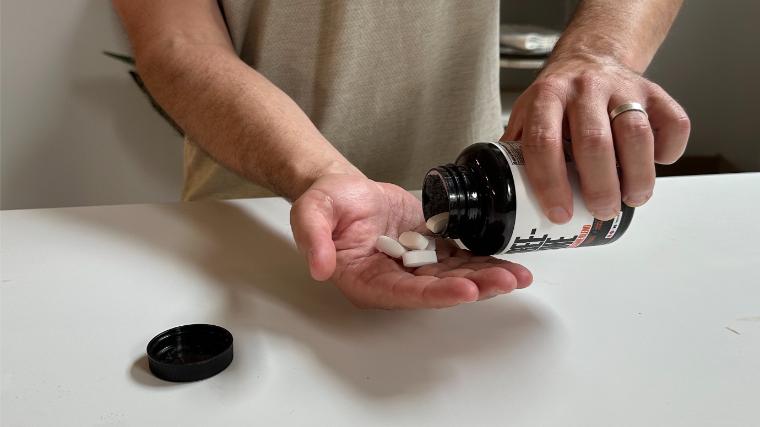
More recently though, research has shown that when used at the recommended dosage, creatine does not cause kidney damage. In fact, one large meta-analysis concluded, “Today, after more than 20 years of research which demonstrates no adverse effects from recommended dosages of creatine supplements on kidney health, unfortunately, this concern persists.” (3)
However, it should be noted that many studies are often conducted on healthy individuals. Therefore, although creatine does not result in kidney damage or affect renal function when taken at recommended doses, those with pre-existing kidney function issues should be cautious with their use of creatine. (10)
Hair Loss
If you feel like taking creatine has you playing Russian Roulette with your hairline, we have good news. There has been no research establishing a link between hair loss and creatine. In fact, as BarBend’s Gabrielle Fundaro, Ph.D., CHC, explains, the idea of creatine leading to hair loss can be traced back to a 2009 study of 20 college rugby players.
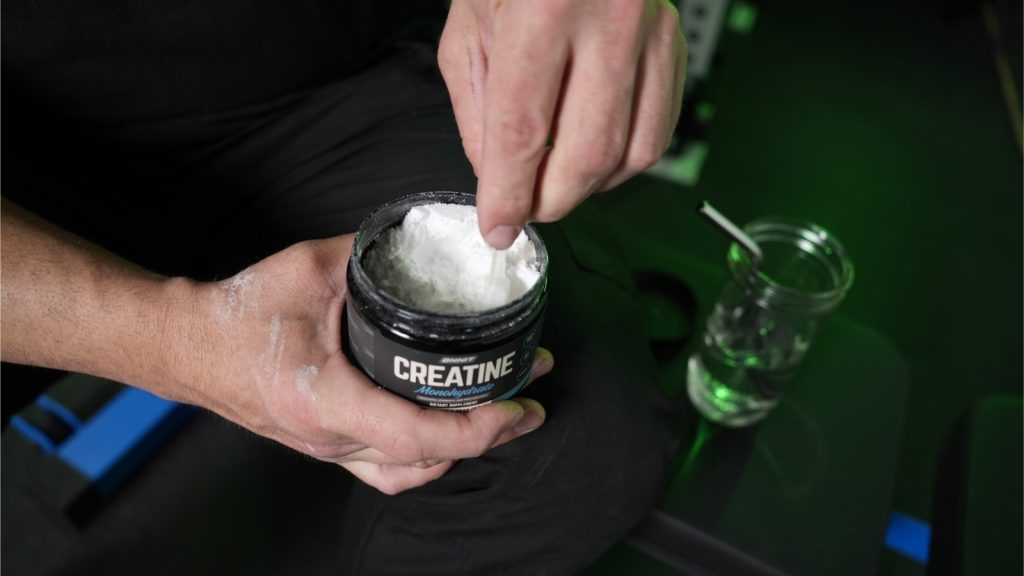
“After a one-week loading phase using 25 grams of creatine per day, the rugby players took 5 grams per day for two more weeks,” says Fundaro. At the end of the study, levels of dihydrotestosterone (DHT) in their blood had gone up. DHT is an androgen (a hormone that promotes tissue growth).” (3)
They continue, “The concentrations found in this study were still within normal physiological ranges. No studies have actually reported direct hair loss or baldness as potential effects of creatine supplementation.” (3)(11)
How Does Creatine Impact Strength Training?
Decades of creatine research has demonstrated that it can potentially improve exercise performance. “Creatine is very well studied for its strength training benefits, specifically creatine monohydrate,” says our expert reviewer and registered dietitian Courtney Pelitera. Along with increasing strength and power, creatine may help build muscle and aid recovery. (1) Creatine may also have cognitive benefits, potentially helping to increase focus and awareness during a set. (13) Let’s break down the research-backed benefits of creatine.
May Increase Strength and Power
Studies show that creatine supplementation can increase your muscular contractions during highly-intense training — potentially due to its role in increasing your ATP. (1) When you are training heavy squats and deadlifts, the muscle cells in your body need ATP as an energy source. (5) Translation: Higher levels of ATP may help you lift heavier weights. Creatine has also been shown to help increase your training adaptations. (1)
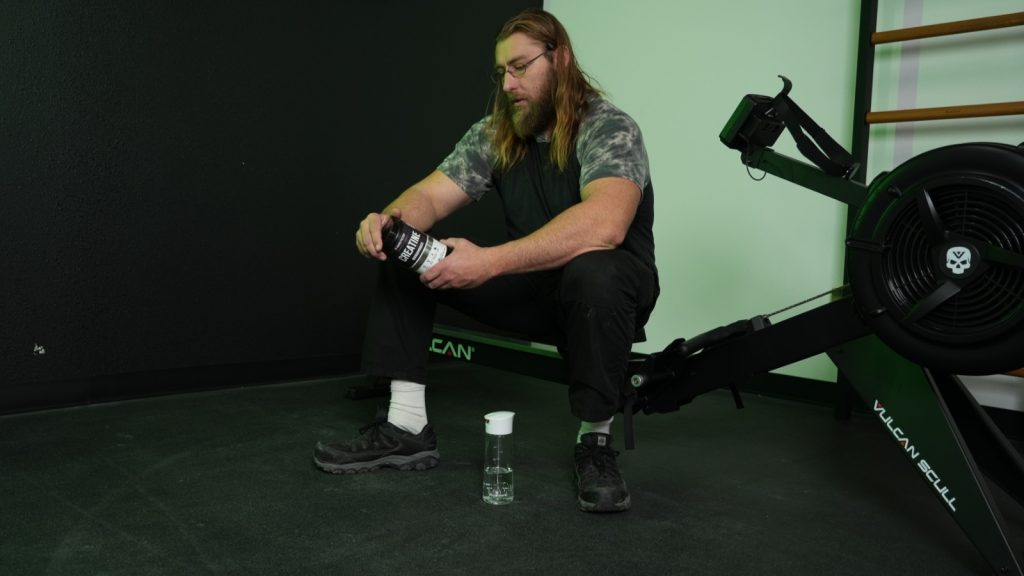
A 2020 study was done on healthy young adults participating in a resistance-training program for six weeks. One group supplemented with creatine and the other group took a placebo. The creatine group significantly increased their strength in the chest press, leg press, and total body strength. (14) While using creatine alone won’t magically make you stronger, combining it with quality training just might.
Helps Build Muscle Mass
“Creatine increases overall strength performance and increases lean muscle tissue, especially when paired with a strength training regimen,” Pelitera says. “Muscle size physically increases with increasing dietary creatine and muscle movements are faster.” (15)(16) A review of 35 studies on 1,195 people examined creatine’s impact on hypertrophy. The participants in these studies combined creatine supplementation with either resistance training, mixed exercise, or no exercise. (15)(16)
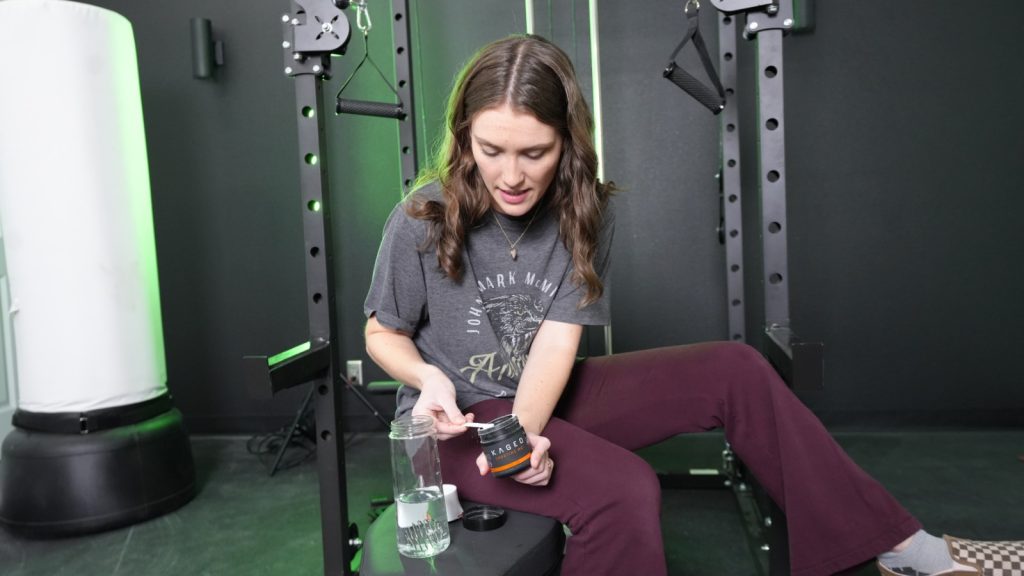
Those who resistance trained gained 2 pounds of lean muscle mass and the other groups did not see any gains. (15) This review indicates that taking creatine alone may not support building muscle. However, when combined with resistance training, creatine may help spur muscle growth.
Improves Recovery
Creatine has been shown to potentially aid recovery following a workout. Along with carbohydrates and protein, creatine can assist in refilling your glycogen stores after training. (17) Creatine can work as an antioxidant in your body, potentially playing a role in reducing inflammation and muscle soreness. (1)
Because of its ability to increase ATP and energy availability, it may also help you withstand a higher volume of training. This delay in fatigue could also help improve recovery during your session, as well. (1)
Boosts Focus
While creatine has been researched for decades, newer studies have shown that it may also promote neurological health. Your skeletal muscles hold 80 percent of the creatine in your body, but 20 percent is used by the brain. (13)
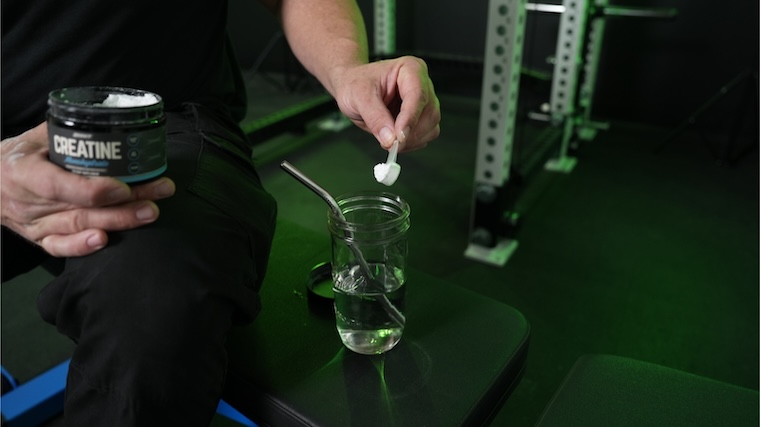
Some research indicates that creatine may help improve cognition, processing, and overall brain function. (13) By potentially improving reaction time, coordination, and motor control, creatine can support improved athletic performance. It may also reduce your perceived amount of mental fatigue, helping to extend your effort and output during workouts. (13)
Conclusion
When combined with resistance training, creatine benefits can include increased lean muscle mass, improved strength and power, and quicker recovery. (1)(14)(15)(17) As your muscles recover after a workout, creatine can help refuel and replenish your energy supply, helping you gear up for your next session. While creatine has been associated anecdotally with potential negative side effects, many of these are not backed up by the research.
Those who don’t adhere to the recommended dosage of 3 to 5 grams might experience gastrointestinal distress or issues with short-term water retention. (3)(7) Though it has not been linked to kidney damage in healthy people, those with liver or kidney conditions should consult their doctors before taking creatine. (6)(3)(10)
Creatine Side Effects FAQs
How much creatine per day?
According to our expert reviewer and registered dietitian Chelsea Rae Bourgeois, “Research shows creatine supplements are best absorbed in doses of 3-5 grams.” When consumed daily, this amount is considered safe and provides creatine’s robust potential benefits — increased strength and power, greater muscle mass, and quicker muscle recovery. (1)(2)(14)(15)(17)
Is creatine OK to take everyday?
Yes! The standard research-backed 3- to 5-gram dosage of creatine is intended to be consumed on a daily basis, whenever it is convenient for you.
Is creatine bad for you?
Creatine is considered to be safe. Many athletes take creatine for help increasing muscle strength or improving recovery, but according to the Mayo Clinic, not everyone may experience these benefits. (1)(14) “While taking creatine might not help all athletes, evidence suggests that it generally won’t hurt if taken as directed.” (2)
Should I take creatine?
Creatine may increase strength and power, help build muscle mass, and aid muscle recovery. (1)(14)(15)(17) However, before beginning any regular supplementation, it’s best to consult with a trusted healthcare professional.
Is creatine worth the risks?
While some athletes may experience gastrointestinal issues when taking any supplement, creatine is considered to be safe. Many anecdotal reports of negative side effects are not supported by research.
Is there a link between creatine and high blood pressure?
While research indicates that creatine kinase — the central regulatory enzyme of energy metabolism — is associated with blood pressure, creatine monohydrate supplementation is not thought to alter the creatine kinase response to eccentric exercise. (18)(19)
Is creatine bad for your kidneys?
Research has shown that when taken at the recommended dosage, creatine does not cause kidney damage. “After more than 20 years of research which demonstrates no adverse effects from recommended dosages of creatine supplements on kidney health, unfortunately, this concern persists,” one meta-analysis concluded. (3)
When to see a doctor for creatine side effects?
Many of creatine’s purported side effects are minor and likely do not require medical intervention. That said, if you are experiencing any noticeable health effects from a dietary supplement, it’s best to follow up with your doctor right away. You can also refer to the guidance posted on the product label for more specific instructions.
How can you minimize creatine side effects?
Your best bet to keep creatine’s side effects to a minimum would be to adhere strictly to the research-backed dosage of three to five grams. You can also try taking it consistently at the same time of day, with food and water, to potentially stave off some of the gastrointestinal issues that may arise.
References
- Kreider RB, Kalman DS, Antonio J, Ziegenfuss TN, Wildman R, Collins R, Candow DG, Kleiner SM, Almada AL, Lopez HL. International Society of Sports Nutrition position stand: safety and efficacy of creatine supplementation in exercise, sport, and medicine. J Int Soc Sports Nutr. 2017 Jun 13;14:18.
- Mayo Foundation for Medical Education and Research. (2023b, December 13). Creatine. Mayo Clinic. https://www.mayoclinic.org/drugs-supplements-creatine/art-20347591
- Antonio, J., Candow, D. G., Forbes, S. C., Gualano, B., Jagim, A. R., Kreider, R. B., Rawson, E. S., Smith-Ryan, A. E., VanDusseldorp, T. A., Willoughby, D. S., & Ziegenfuss, T. N. (2021). Common questions and misconceptions about creatine supplementation: what does the scientific evidence really show?. Journal of the International Society of Sports Nutrition, 18(1), 13.
- Brosnan ME, Brosnan JT. The role of dietary creatine. Amino Acids. 2016 Aug;48(8):1785-91. doi: 10.1007/s00726-016-2188-1. Epub 2016 Feb 13.
- Dunn J, Grider MH. Physiology, Adenosine Triphosphate. [Updated 2023 Feb 13]. In: StatPearls [Internet]. Treasure Island (FL): StatPearls Publishing; 2023 Jan-.
- Hall, M., & Trojian, T. H. (2013). Creatine supplementation. Current sports medicine reports, 12(4), 240–244.
- Ostojic, S. M., & Ahmetovic, Z. (2008). Gastrointestinal distress after creatine supplementation in athletes: are side effects dose dependent?. Research in sports medicine (Print), 16(1), 15–22.
- Lopez, R. M., Casa, D. J., McDermott, B. P., Ganio, M. S., Armstrong, L. E., & Maresh, C. M. (2009). Does creatine supplementation hinder exercise heat tolerance or hydration status? A systematic review with meta-analyses. Journal of athletic training, 44(2), 215–223.
- Maughan, R. J., & Shirreffs, S. M. (2019). Muscle Cramping During Exercise: Causes, Solutions, and Questions Remaining. Sports medicine (Auckland, N.Z.), 49(Suppl 2), 115–124.
- Davani-Davari, D., Karimzadeh, I., Ezzatzadegan-Jahromi, S., & Sagheb, M. M. (2018). Potential Adverse Effects of Creatine Supplement on the Kidney in Athletes and Bodybuilders. Iranian journal of kidney diseases, 12(5), 253–260.
- van der Merwe, J., Brooks, N. E., & Myburgh, K. H. (2009). Three weeks of creatine monohydrate supplementation affects dihydrotestosterone to testosterone ratio in college-aged rugby players. Clinical journal of sport medicine : official journal of the Canadian Academy of Sport Medicine, 19(5), 399–404.
- Poortmans, J. R., & Francaux, M. (2000). Adverse effects of creatine supplementation: fact or fiction?. Sports medicine (Auckland, N.Z.), 30(3), 155–170.
- Roschel H, Gualano B, Ostojic SM, Rawson ES. Creatine Supplementation and Brain Health. Nutrients. 2021 Feb 10;13(2):586.
- Mills S, Candow DG, Forbes SC, Neary JP, Ormsbee MJ, Antonio J. Effects of Creatine Supplementation during Resistance Training Sessions in Physically Active Young Adults. Nutrients. 2020 Jun 24;12(6):1880.
- Delpino FM, Figueiredo LM, Forbes SC, Candow DG, Santos HO. Influence of age, sex, and type of exercise on the efficacy of creatine supplementation on lean body mass: A systematic review and meta-analysis of randomized clinical trials. Nutrition. 2022 Nov-Dec;103-104:111791. doi: 10.1016/j.nut.2022.111791. Epub 2022 Jul 8.
- Gualano, B., Rawson, E. S., Candow, D. G., & Chilibeck, P. D. (2016). Creatine supplementation in the aging population: effects on skeletal muscle, bone and brain. Amino acids, 48(8), 1793–1805.
- Hall M, Manetta E, Tupper K. Creatine Supplementation: An Update. Curr Sports Med Rep. 2021 Jul 1;20(7):338-344. doi: 10.1249/JSR.0000000000000863.
- Brewster, L. M., Mairuhu, G., Bindraban, N. R., Koopmans, R. P., Clark, J. F., & van Montfrans, G. A. (2006). Creatine kinase activity is associated with blood pressure. Circulation, 114(19), 2034–2039.
- Taylor, B. A., Panza, G., Ballard, K. D., White, C. M., & Thompson, P. D. (2018). Creatine supplementation does not alter the creatine kinase response to eccentric exercise in healthy adults on atorvastatin. Journal of clinical lipidology, 12(5), 1305–1312.